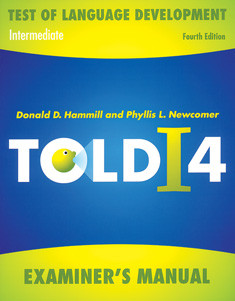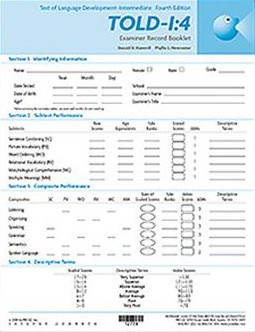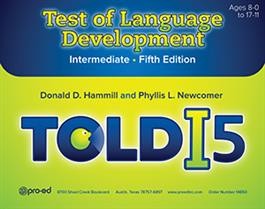The Test of Language Development-Intermediate–Fourth Edition (TOLD-I:4), is the best TOLD:I ever — well-constructed, reliable, practical, research-based, and theoretically sound. Professionals can use the TOLD:I-4 to (1) identify children who are significantly below their peers in oral language proficiency, (2) determine their specific strengths and weaknesses in oral language skills, (3) document their progress in remedial programs, and (4) measure oral language in research studies.
Subtests and Composites
The TOLD:I-4 comprises six subtests that measure semantics (i.e., meaning and thought) or grammar (i.e., syntax and morphology) skills. Two subtests measure listening abilities; two measure organizing abilities; and two measure speaking abilities. The combination of all six subtests represents overall Spoken Language.
- Sentence Combining — the child is to form one compound or complex sentence from two or more simple sentences spoken by the examiner (grammar, speaking)
- Picture Vocabulary — the child is to point to one picture (of six per card) that best represents a series of two-word stimulus (semantics, listening)
- Word Ordering — the child is to form a complete, correct sentence from a randomly-ordered string of words, ranging from three to seven in length (grammar, organizing)
- Relational Vocabulary — the child must tell how three words, spoken by the examiner, are alike (semantics, organizing)
- Morphological Comprehension — the child must distinguish between grammatically correct and incorrect sentences (grammar, listening)
- Multiple Meanings — the examiner says a word to a child who responds by saying as many different meanings for that word as he/she can think of (semantics, speaking)
Features of the TOLD-I:4
- All new normative data were collected from a demographic representative sample of the 2005 U.S. population.
- Floor effects have been eliminated.
- Study of item bias has been expanded.
- Numerous validity studies, including studies of the test’s “sensitivity” and “specificity” have been provided.
- A new composite (Organizing) has been included in the battery.
- A new subtest (Multiple Meanings), representing the “Semantics” and “Speaking” constructs, has been added.
- The Generals and Grammatic Comprehension subtests have been renamed to better reflect their contents; the new names are Relational Vocabulary and Morphological Comprehension.
- Testing age range has been extended to include students between 13-0 and 17-11.
- Test manual has been streamlined to be more user-friendly.

 Proud to be Canadian
Proud to be Canadian

